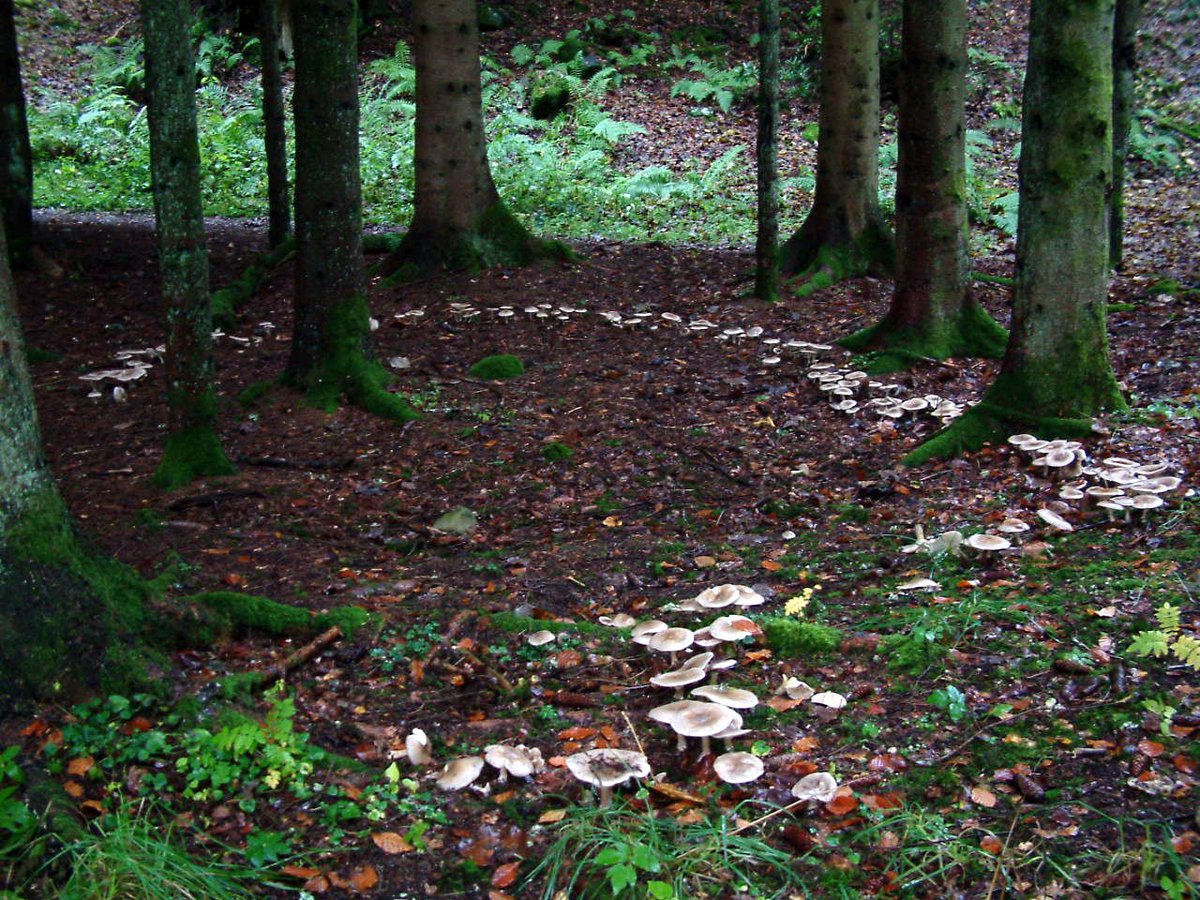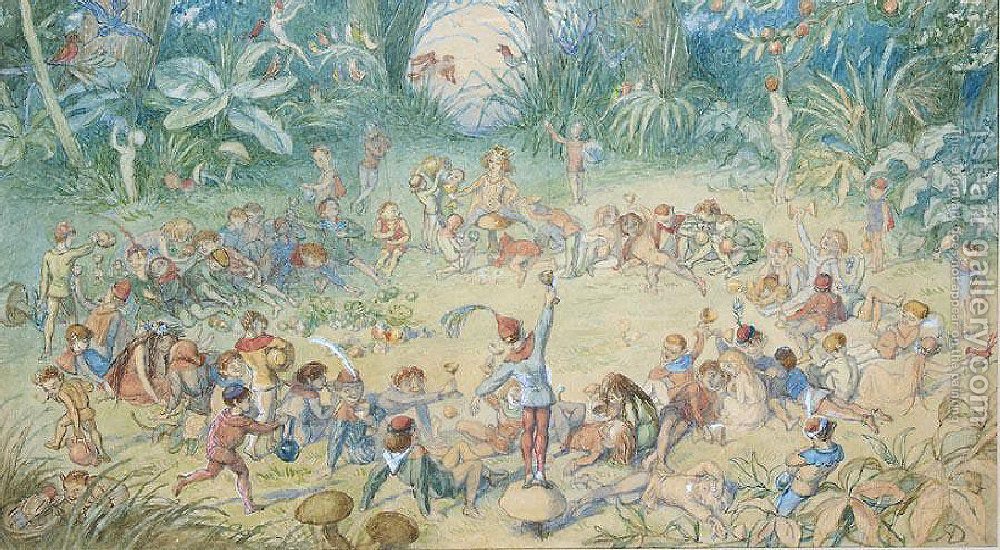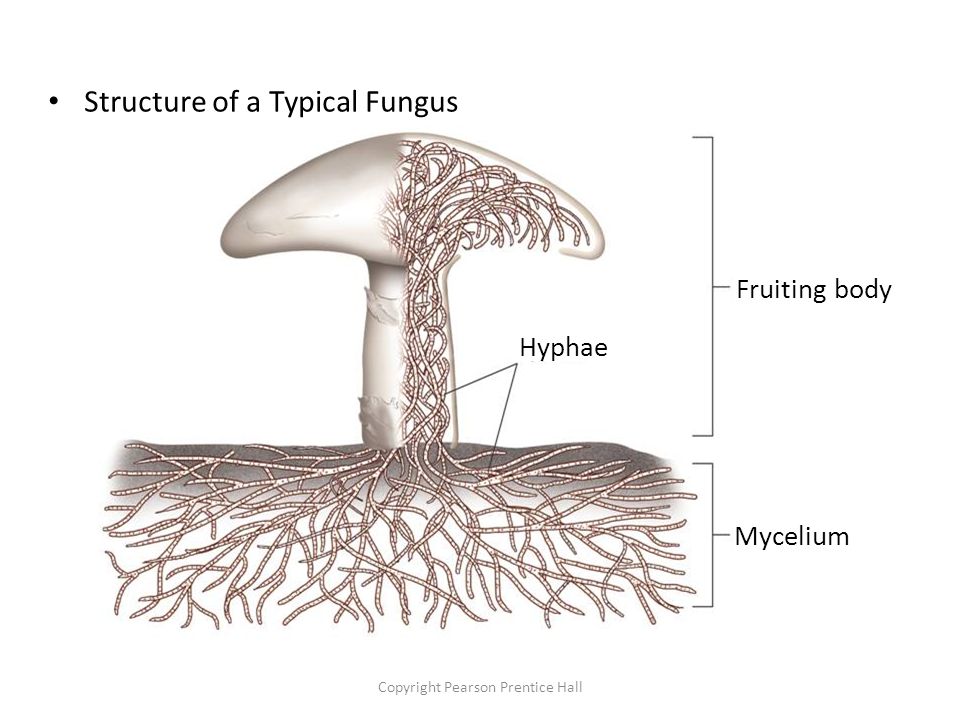
This is a thread about fairy rings and Cletus the Slack-jawed Yokel. 



Fairy rings are the circles of mushrooms you sometimes see in lawns, forests and meadows. They're pretty striking, and there are a lot of old folktales attributing them to fairies, elves and witches. One Dutch folk tale has it that these rings are where the Devil churns his milk. 







The modern understanding is less mystical but still worth geeking out over. Fairy rings grow in a circle because all the mushrooms are part of the same fungus. Underground, they're all connected.
(photo by Eric Albrecht)
(photo by Eric Albrecht)

The mushrooms are the fruiting bodies of a single fungal mass. Underground is the mycelium, there even when there aren't mushrooms at the surface. You can think of the mycelium as the plant and the mushrooms as its fruit. 

Fungal fairy rings sometimes show up as a particularly lush or poor circle of lawn grass, without the mushrooms. A more prosaic examples of this tip-of-the-iceberg phenomenon is bread mold. By the time you see the mold on the surface, the inside can be riddled with mycelia. Yum. 

I started thinking about fairy rings as #MeToo stories started flooding forth and Nazis crawled out onto the pages of the New York Times. It's like they were all there just under the surface, waiting for the right conditions to bring them out.
What really reminded me of fairy rings was all the people saying "I can't believe how bad it was”. The phrase "hidden in plain sight" kept coming up. A lot of men and a lot of white people were blind to the full extent of the problem until these glaring examples burst into view.
And like each mushroom in a ring, these incidents aren't independent. They're the symptom, not the cause. Each incident is rooted in the sexism and bigotry that riddles America like mycelia in an old loaf of bread.
The people committing these acts were supported and enabled by the people and institutions around them, which were in turn shaped by a society that tells men/white people we're better and deserve better.
These people acted according, abusing the power they were given or lashing out when they didn't get the power they felt entitled to. These behaviors are inevitable results of that message. They're the poisonous fruiting bodies at the tip of the mycelium.
The most important thing about this metaphor? It shouldn't work. With fairy rings, the connections and support systems are literally underground. Solid dirt blocks them from our view. Here they're out in the open. They're hidden in plain sight, which is to say not hidden at all.
So for those of us who've been surprised by any of this, one of the most important challenges we face is figuring out how it’s stayed hidden in plain sight. What are the aspects of our society and psychologies that obscure certain things that are right in front of our face?
Until we figure that out, we're part of the problem. To push the metaphor, our blindness to systemic sexism and racism is itself a part of the mycelium. The blindness leads to complacency and denial, and in a million ways big and small makes us complicit.
So we need to take a look at the things we do to stay blind. Things like:
- dismissing an endless stream of white male shooters as "lone wolves"
- focusing on exceptions (like black or female CEOs) to dismiss the big picture
- not listening to the targets of racism and sexism
- dismissing an endless stream of white male shooters as "lone wolves"
- focusing on exceptions (like black or female CEOs) to dismiss the big picture
- not listening to the targets of racism and sexism
- thinking America is reasonably fair because it feels that way to you
- kneejerk rejection of the possibility we have racist or sexist tendencies
- treating racists as "other", as a thing or group distant from ourselves
- kneejerk rejection of the possibility we have racist or sexist tendencies
- treating racists as "other", as a thing or group distant from ourselves
Which brings me to this guy. Good ol' Cletus, the Simpsons' over-the-top stereotype of The Hick. 

When white people talk about racists, we love to picture people like Cletus. But it's not true. Just as an example, Trump got the vote of most Republican. He won a majority of men, whites, people making over 50k/yr, and suburb dwellers. He won with Ward, not Cletus. 



(“But voting for Trump doesn't make you racist.” If you voted for him in spite of his openly white supremacist campaign, then you used white supremacy as a vehicle to reach other goals. Still racist. And if you were blind to his racism, you were blind to yours too.)
We play this game all the time. We let ourselves off the hook by saying someone else- someone like Trump or poor Cletus- is the real racist. Hell, we've even let Trump a little off the hook sometimes, by scapegoating Bannon or Miller or Sessions. "The problem is… that guy!"
It's the same with sexism. Plenty of the people making Handmaid's Tale references about Mike Pence said Hillary was too power-hungry in 2016, and don't see the common thread of keeping women "in their place". Sexism is something other people do. Villains like Pence and Weinstein.
But if you're a privileged person pointing a finger at Weinstein or Trump, without confronting your own role in the system that produced them, you're like a part of the mycelium tsking the mushroom above you.
I don't know you, maybe you're just a nice slice of bread or patch of lawn. This is Twitter, so maybe you're a fruiting body. But if you enjoy some kind of privilege, the odds are good you're part of the mycelium. And we shouldn't assume we aren't.
Thanks to @QueenieG2017, @kazweida, @ProfCAnderson, @absurdistwords and many more on here for some of the ideas that shaped this thread. (All errors mine.)
This fits too well with the fairy ring analogy. People respond more to flagrant abuses, while the majority of damaging behavior stays underground.
External Tweet loading...
If nothing shows, it may have been deleted
by @KateClancy view original on Twitter
• • •
Missing some Tweet in this thread? You can try to
force a refresh





